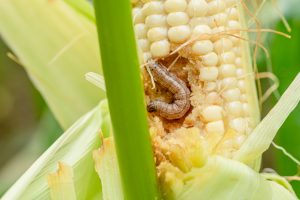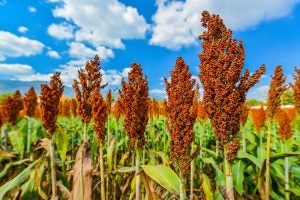Penn State researchers have released reports from a new study showing that flavonoids from sorghum plants kill fall armyworm pests on corn and may help protect corn crops.
According to the news release, when sorghum flavonoids are sprayed on the leaves of corn, the flavonoids can stunt and even kill fall armyworms. Professor of maize genetics Surinder Chopra suggests this may be a new method for use as a nontoxic pest-management strategy for corn.
Fall armyworms are an invasive pest that is responsible for corn crop damage around the world. The pests are responsible for significant crop yield decreases. The caterpillars are exceptionally destructive because of their habit of feeding on younger corn leaves inside the whorl where they grow. After the whorl opens, the leaves are already destroyed.

Flavonoids are a natural compound often seen as a pigment in flowers, vegetables, and fruits. Usually considered nonessential, flavonoids are regarded as a simple byproduct of the plant’s primary metabolism that produces sugars and other metabolites to produce seed yields.
Chopra attributes modern breeding methods to decreasing flavonoids in crops: “When you survey the leaves and other parts of commercially grown corn, you do not see production of these flavonoids anymore,” he says, “These compounds were naturally present at one point until we started breeding against them. Actually, we did not breed against them so much as we just lost them trying to develop higher-yielding varieties.”
»Related: Isoflavones in soybeans help protect pigs against viral infections
Chopra has been working for decades with a research team at Penn State’s College of Agricultural Sciences to study and develop new lines of corn that combine flavonoid overproduction with other desirable traits.
The research team selects the gene that produces a precursor to the flavonoids in the sorghum crops that are harmful to fall armyworms. This gene is then inserted into corn, making them a more resilient plant – resistant to fall armyworms and other crops.
Researchers have compared the level of fall armyworm survival and feeding damage based on four related lines of corn grown at Penn State’s Russell E Larson Agricultural Research Center. The researchers used two genetically modified lines that produce flavonoids and two which do not produce flavonoids.
“The feeding assays showed significantly high mortality of larvae that were fed on flavonoid-producer lines compared to nonflavonoid lines or the wild types,” Chopra said. “And significantly less damage was done to corn plants producing flavonoids than to flavonoid-free corn.”
The team also discovered that sorghum flavonoids sprayed on susceptible lines of corn increased fall armyworm larvae mortality and improved the resistance of the corn lines to the pest.

Gary Felton, an entomologist at Penn State who has been part of the collaborative efforts to study flavonoid effects on fall armyworms, observed that when fall armyworms ingest flavonoids, the intestinal tract is degraded. Felton says, “The membrane that protects the caterpillar’s gut was severely damaged in larvae fed on leaves of flavonoid-producer corn lines, compared to wild types,” he said. “The effectiveness of the flavonoids as feeding deterrents demonstrates the eco-friendly potential for the management of fall armyworm larvae.”


